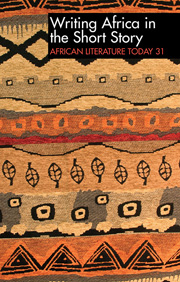Book contents
- Frontmatter
- Dedication: Chinua Achebe Joins the Ancestors
- Stop Press/ Tribute to Kofi Awoonor 1935–2013
- Contents
- Notes on Contributors
- Editorial Article
- Articles
- “Real Africa”/“Which Africa?”: The Critique of Mimetic Realism in Chimamanda Ngozi Adichie's Short Fiction
- Writing Apartheid: Miriam Tlali's Soweto Stories
- Articulations of Home & Muslim Indentity in the Short Stories of Leila Aboulela
- Ugandan Women in Contest with Reality: Mary K. Okurutu's A Women's Voice & the Women's Future
- Snapshots of the Botswana Nation: Bessie Head's The Collector of Treasures & Other Botswana Village Tales as a National Project
- Widowhood – Institutionalized Dead Weight to Personal Identity & Dignity: A Reading of Ifeoma Okoye's The Trial & Other Stories
- Feminist Censure of Marriage in Islamic Societies: A Thematic Analysis of Alifa Rifaat's Short Stories
- Diaspora Identities in Short Fiction by Chimamanda Ngozi Adichie & Sefi Atta
- Exposition of Apartheid South African Violence & Injustice in Alex la Guma's Short Stories
- Locating a Genre: Is Zimbabwe a Short Story Country?
- Mohammed Dib's Short Stories on the Memory of Algeria
- Ama Ata Aidoo's Short Stories: Empowering the African Girl-Child
- Ama Ata Aidoo: an Interview for ALT
- Reviews
Ama Ata Aidoo's Short Stories: Empowering the African Girl-Child
from Articles
Published online by Cambridge University Press: 05 December 2013
- Frontmatter
- Dedication: Chinua Achebe Joins the Ancestors
- Stop Press/ Tribute to Kofi Awoonor 1935–2013
- Contents
- Notes on Contributors
- Editorial Article
- Articles
- “Real Africa”/“Which Africa?”: The Critique of Mimetic Realism in Chimamanda Ngozi Adichie's Short Fiction
- Writing Apartheid: Miriam Tlali's Soweto Stories
- Articulations of Home & Muslim Indentity in the Short Stories of Leila Aboulela
- Ugandan Women in Contest with Reality: Mary K. Okurutu's A Women's Voice & the Women's Future
- Snapshots of the Botswana Nation: Bessie Head's The Collector of Treasures & Other Botswana Village Tales as a National Project
- Widowhood – Institutionalized Dead Weight to Personal Identity & Dignity: A Reading of Ifeoma Okoye's The Trial & Other Stories
- Feminist Censure of Marriage in Islamic Societies: A Thematic Analysis of Alifa Rifaat's Short Stories
- Diaspora Identities in Short Fiction by Chimamanda Ngozi Adichie & Sefi Atta
- Exposition of Apartheid South African Violence & Injustice in Alex la Guma's Short Stories
- Locating a Genre: Is Zimbabwe a Short Story Country?
- Mohammed Dib's Short Stories on the Memory of Algeria
- Ama Ata Aidoo's Short Stories: Empowering the African Girl-Child
- Ama Ata Aidoo: an Interview for ALT
- Reviews
Summary
Within nearly all nations today the centre is located in the dominant social stratum, a male bourgeois minority – Hence the need to move the centre from minority class establishments within nations to the real creative centres among the working people in conditions of gender, racial and religious equality.
(Ngugi wa Thiong'o, Moving the Centre, 1993)The female [African] writer should be committed in three ways: as a writer, as a woman, and as a Third World Person.
(Molara Ogundipe-Leslie, 1994)I don't deny that we belong to a larger, non-northern world and the dynamics that operate in a situation like that, but find my commitment as an African, the need to be an African nationalist a little more pressing. It seems there are things relating to our world, as African people, which are of a more throbbing nature in an immediate sense.
(Ama Ata Aidoo, quoted in Adeola James, 1990)Ama Ata Aidoo's collection of short stories: The Girl Who Can and Other Stories (1997) is a creative work that could be justifiably described as woman-centred in a progressive sense. In it she foregrounds female characters, women's needs and issues. The collection seems to have fulfilled Molara Ogundipe-Leslie's requirements for the African female writer to be committed ‘as a writer, as a woman and as a Third World person’ (1994). Aidoo herself has added commitment as an African nationalist to the list (ibid). A keen analysis of the stories reveals yet another criterion which includes the common concerns basic to all women’s movements worldwide: understanding patriarchal ideology and power, rejecting socially constructed dichotomies and dualism, demonstrating solidarity with women, and affirming women’s agency (Antrobus 2004).
- Type
- Chapter
- Information
- Writing Africa in the Short Story , pp. 148 - 161Publisher: Boydell & BrewerPrint publication year: 2013

